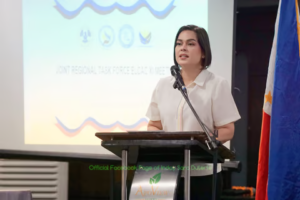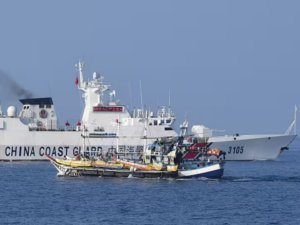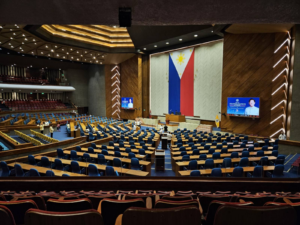
MANILA – President Ferdinand R. Marcos Jr. on Thursday expressed willingness to collaborate with China on possible joint oil exploration in the West Philippine Sea (WPS).
During a media interview in Quezon City, Marcos proposed exploring alternative methods to ensure the immediate development of oil and gas resources in contested waters.
Marcos made the statement, in case the possible government-to-government partnership fails to proceed.
“We’ll have to find a way kasi kailangan na natin eh (we really need it now). We already need, kung mahanap dyan kailangan na talaga ng Pilipinas (whatever resources we could find because the Philippines really need that now),” he said on the sidelines of the Kadiwa ng Pasko Caravan.
“‘Yung China maliit na bagay sa kanila ‘yun eh. Sa atin malaking bagay ‘yan. So, kailangan natin ipaglaban at mapakinabangan kung meron ngang oil talaga (It’s a small thing for China. But for us, it’s a big help. So, we have to pursue that and we will benefit if there is really oil there),” he added.
Moreover, Marcos emphasized the significance of addressing the “roadblock” in the joint exploration talks.
He said this while acknowledging constitutional issues that contributed to the delays in the possible joint exploration between the Philippines and China.
“Kasi kini-claim ng China kanila ‘yun, eh atin naman talaga iyan. So, sinasabi ng Pilipinas, basta’t ‘yung batas kailangan masundan ‘yung sa Pinas. Ang sinasabi naman ng Chinese, hindi, amin iyan eh, kaya’t kailangan masundan is Chinese. Kaya ‘yun talaga ang roadblock doon (China is claiming [WPS] as its property, but that is ours. For the Philippines’ part, we have to follow the law. But the Chinese are saying that they own that and they want their own terms to be followed. That’s the roadblock there),” Marcos said.
The Philippines signed a memorandum of understanding (MOU) in November 2018 with China on joint oil and gas development in WPS.
Under the Duterte administration, however, the Philippines terminated the talks before Marcos assumed presidency on June 30 because of constitutional constraints and issues on the country’s sovereignty.
In September this year, the Department of Foreign Affairs said the two countries have so far made “initial and general discussions” on possible joint exploration in WPS but have not yet progressed to “working-level talks.”
On November 17, Marcos and Chinese President Xi Jinping agreed during their inaugural bilateral meeting in Bangkok, Thailand, that the immediate conclusion of negotiations for the final and binding Code of Conduct (COC) in the South China Sea (SCS) will help address maritime disputes among littoral states.
The Philippines won its petition against China before the Permanent Court of Arbitration (PCA) in The Hague, Netherlands on July 12, 2016 after the court invalidated Beijing’s supposedly historic rights over nearly the entire SCS, including the WPS.
China has persistently disregarded the 2016 PCA ruling notwithstanding the historic win of the Philippines.















